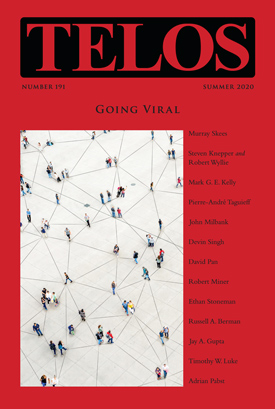The rage about corona and its consequences has evidently elicited a mental disturbance with global reach. Every insanity has now become acceptable—on the condition that the insanity claims to be of the “left,” i.e., anti-fascist, anti-racist, anti-capitalist, etc. Whoever wants to keep it at a distance will be silenced. This has come to be called “cancel culture.” While the loudspeakers still boom about the political correctness of variety, diversity, and multiculturalism, we are living in fact in a radically illiberal period that no longer permits discussions. Germany has become incapable of debates—this is the result of the fanatic moralization of all life questions.
|
The pandemic crisis has surfaced fundamental tensions between the scope of state power and commitments to democracy and dissent. Facing an emergency, the state must act vigorously, but liberal democracies are premised on understandings of basic rights, maximal freedom, and limited government, desiderata at odds with state power. This opposition has been playing out in different ways in the United States and in Europe, and in Europe nowhere more saliently than in Germany. A recent controversy in Germany provides insight into the process by which the need to respond to the pandemic acts as a vehicle to enhance state power in a way that threatens basic freedoms. This is the core conflict: the genuine urgency of developing public health measures to contain the pandemic can contribute simultaneously to the augmentation of state power. Questions of the vitality of democracy are at stake, and not only in Germany. The following essay originally appeared in German at Tichys Einblick. Translated by Russell A. Berman, who has written a separate note on the topic here. At the outset I want to make clear that I view the stipulations of the governments for containing the corona pandemic as appropriate and that it is necessary to obey them. Yet this is not the central issue. Instead, the central issue is that the BLM demonstration against racism was widely praised and tolerated, while the demonstration of August 1 [against corona restrictions—trans.] was widely condemned, despite posing identical dangers. The most valuable good for a government is its credibility. One does not need it in a dictatorship, as long as the arguments come from the barrel of a gun. In a democracy, however, credibility is one of the foundational conditions for domestic peace. The following interview was conducted by Alexander Wendt on July 5, 2020, and originally appeared in German on Tichys Einblick on July 13, 2020. Translated by Russell A. Berman. Alexander Wendt: Professor Bolz, the costs of the coronavirus pandemic are still unknown, but they will surely leave deep scars for years to come. Will our society return from post-materialism to a society with hard materialist concerns with numbers and balance sheets? Norbert Bolz: Even before the coronavirus crisis, I had doubts as to whether the notion of a post-material society made much sense. To my mind, the “post-material” term only makes real sense as a description of digitalization and the rise of information technology. But the superstructure that is usually meant by “post-material” seems to me to be mainly a substitute for religion, and it never had the real significance for society that many ascribe to it. The following essay was originally published in French as “La Grèce et la pandémie: Quelques réflexions,” in Revue Politique, June 30, 2020, and appears here by permission. Translated by Russell A. Berman.
|
||||
|
Telos Press Publishing · PO Box 811 · Candor, NY 13743 · Phone: 212-228-6479 Privacy Policy · Data Protection Copyright © 2024 Telos Press Publishing · All Rights Reserved |
||||
 It is widely recognized that Greece survived the difficult test of COVID-19 well. The international press has been writing about the “little Greek miracle” for more than a month: a country ravaged by the economic crisis of the past years has been able to resist the public health challenge better than many other European countries. And it is right to emphasize this unexpected success as due primarily to the speed of the government’s decisions, the closing of the borders, the strict lockdown of about two months, but also the population’s obedience to special laws issued by the authorities, both in terms of health and politics. Every evening at 6:00 PM, the epidemiologist Professor Sotirios Tsiodras spoke to the public directly on television about the measures taken and the track of the pandemic, in a calm, humane, and confident tone, showing appropriate emotions when he spoke of the deaths, turning into the family doctor, a personality familiar to everyone.
It is widely recognized that Greece survived the difficult test of COVID-19 well. The international press has been writing about the “little Greek miracle” for more than a month: a country ravaged by the economic crisis of the past years has been able to resist the public health challenge better than many other European countries. And it is right to emphasize this unexpected success as due primarily to the speed of the government’s decisions, the closing of the borders, the strict lockdown of about two months, but also the population’s obedience to special laws issued by the authorities, both in terms of health and politics. Every evening at 6:00 PM, the epidemiologist Professor Sotirios Tsiodras spoke to the public directly on television about the measures taken and the track of the pandemic, in a calm, humane, and confident tone, showing appropriate emotions when he spoke of the deaths, turning into the family doctor, a personality familiar to everyone. 







